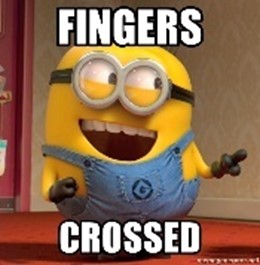Are you looking for a way to wish yourself or someone else good luck? If so, you could say that you have your “fingers crossed.” This post unpacks the meaning and origin of this expression.
Meaning
The meaning of the expression “fingers crossed” is to wish yourself or someone good luck. If someone were to tell you they are going into an interview for work, you could look at them and say “fingers crossed” while making the hand gesture of crossing your index and middle fingers.
You could also make the gesture alone or say “fingers crossed” without making the gesture. Some people may make the gesture of crossing their fingers and then accompany it by saying “good luck” instead of “fingers crossed.” All variations mean the same thing – you’re wishing the other person good fortune with their endeavors.
You’ll use the saying for yourself when asking other people to wish you luck. For example, you could say, “I’m going in for that interview I told you about; fingers crossed for me!”
Example Usage
“That client said he was going to sign for a million dollars. Fingers crossed he’s not wood, and he comes back tomorrow to close the deal.”
“Tiffany is about to go on stage for her scene. I hope she does well, fingers crossed.”
“Sara just went in for the Bar exam. She’s studied hard; let’s hope she passes. Fingers crossed.”
“Our dad just went into the OR for a triple bypass. The doctors say it's touch-and-go at this time, so, fingers crossed that he makes it.”
“We’re heading to the ranch this weekend for some horse riding. I hope it's good weather; we all have our fingers crossed.”


Fingers Crossed Idiom Origin
The origin of the saying “fingers crossed” predates the birth of Christ. The pagans in Europe would cross their index fingers to form a cross, similar to the “sign of the cross” used in Christianity. The pagan religions believed this sign was a symbol of good luck.
The intersection of two lines at right angles is part of “sacred geometry,” forming a junction where benevolent spirits reside. Creating the cross with your fingers allowed you to make a wish in the presence of these spirits.
In the 14th century, in war times, soldiers would avoid crossing fingers with each other as a sign of good luck. The saying would only evolve in writing much later as an expression of good luck. Language experts are unsure of the first appearance of the phrase in writing.
Phrases Similar to Fingers Crossed
- Wish me luck.
- Good luck.
- Hoping and praying.
Phrases Opposite to Fingers Crossed
- No way it’s going to work.
- That’s hopeless.
- No way you’ll make it.
What is the Correct Saying?
- Fingers crossed.
Ways People May Say Fingers Crossed Incorrectly
Some people may use the saying “fingers crossed” to describe the action of “jinx,” where they promise someone they will do something but never intend to keep their promise. So, while this is a technically correct use of the term, it’s not the proper use or definition of the saying.
Acceptable Ways to Phrase Fingers Crossed
You can use the saying “fingers crossed” when describing how you’re hoping that something works out as you expect. The phrase suits professional and social use. You could use it at the office when you’re telling someone that you have your “fingers crossed” that the client signs the deal. Or, you could use it at home to describe that you hope your new recipe turns out as you planned. The expression is another way of wishing yourself or others good luck.